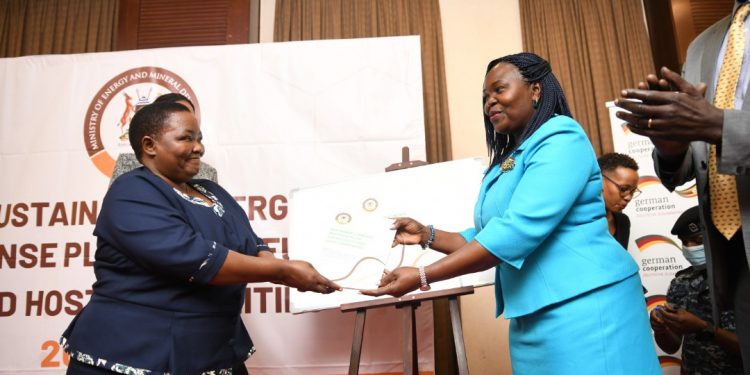KAMPALA – The Prime Minister, Robinah Nabbanja, has launched a four-year (2022-2025) Sustainable Energy Response Plan (SERP) for refugees and the host communities.
Through the programme, the Government targets to support the refugee and host communities “to attain universal access to affordable, reliable, and clean energy for socio-economic transformation in an environmentally sustainable manner”.
Ms Nabbanja said the development of sustainable and effective energy solutions that lead directly to increased access to clean, affordable and reliable energy for refugees and host communities is a priority for the Government of Uganda.
“We want to enhance capacity, mobilise resources and strengthen systems for effective coordination and management of energy programs targeting refugees and host communities, and in line with National and multi-sectoral Policies, Strategies and Plans.”
Dr Ruth Nankabirwa, the Minister of Energy and Mineral Development, said her Ministry led the SERP development efforts hand-in-hand with the Office of the Prime Minister, the Comprehensive Refugee Response Framework (CRRF) Secretariat, Germany Corporation (GIZ), World Bank, and UNHCR. “We are the first country in the world to develop SERP for refugees.”
“We engaged a consultant, with support from GIZ, to work with the task force in developing the SERP from 2020 to 2021. Following comprehensive situational analysis and extensive stakeholder consultations, we identified several issues affecting refugees, leading to the development of SERP,” said Ms Nankabirwa.
The issues identified in the refugees host communities include insufficient access to affordable, clean energy for the needs of households, productive use and social institutions, and unreliable supply and inefficient utilisation of energy.

There is also over-reliance on biomass for cooking with inefficient methods, combined with low access to alternative, sustainable cooking fuels or efficient cooking technologies, as well as issues of environmental degradation due to the continued use of unsustainable energy sources.
The Ambassador of the Federal Republic of Germany to Uganda, Matthias Schauer, said that the SERP launch is perfect timing for the new phase of the CRRF that will focus on and prioritise district-level implementation.
“The Ugandan-German cooperation is especially strong within the energy sector. The German Government is committed to supporting sustainable energy access to the vulnerable communities in Uganda. We all look forward to seeing the SERP implemented and working together in attaining affordable, reliable, clean energy for refugees and host communities,” he said.
The United Nations High Commissioner for Refugees (UNHCR) to Uganda, Mr Matthew Crentsil, commended Uganda’s role as the biggest refugee host country in Africa and one of the world’s biggest in the world, with 1.5 million refugees. “Sustainable energy development for refugees is a priority to UNHCR,” he said.
Other dignitaries at the event included the Minister of Relief, Disaster Preparedness and Refugees, Eng. Hillary Onek; State Minister- Relief, Disaster Preparedness and Refugees Davinia Esther Anyakun; and the Minister of State for Energy, Okaasai S. Opolot.











